- Home
- Michael McDowell
The Elementals Page 3
The Elementals Read online
Page 3
“I don’t know, they haven’t decided yet. They’re not gone decide till we get back from Beldame.”
“Barbara,” said Luker, “whose idea was it for us all to go down to Beldame? I mean, Marian Savage died at Beldame. You think it’s going to do Dauphin a whole lot of good to be down there where his mother died about three days ago?”
Big Barbara shrugged. “You don’t think I’d suggest something like that, do you? It wasn’t Leigh either. It was Dauphin’s idea—Dauphin’s and Odessa’s. Odessa had been down there with Marian, of course—these days when she was so sick, Marian wouldn’t walk across the hall unless Odessa went with her. And anyway, Dauphin and Odessa seemed to think it’d do us all good to go on down there and get it out of our system. You ’member when Bothwell died down there, nobody went back for six months—and that year had a beautiful summer!”
“Bothwell was Dauphin’s father?” asked India.
Big Barbara nodded. “How old was Dauphin when Bothwell died, Luker?”
“Five. Six. Seven,” replied Luker. “I don’t remember. I had forgot that he died at Beldame too.”
“I know,” said Big Barbara. “Who thinks of poor old Bothwell any more? Anyway, it wasn’t as if Marian had been down there all that long either, it’s not as if all her suffering took place down at Beldame. She and Odessa hadn’t been down there more than a day and a half when Marian died. It was real strange. She stayed in the Great House for almost two years, hardly stirring from that room, sleeping all day and awake all night complaining. Then all of a sudden she up and decides that she wants to go to Beldame. Dauphin tried to talk her out of it. I tried to talk her out of it, but Marian gets something in her head, it doesn’t get out again. So she just ups and goes down to Beldame. Dauphin wanted to go with her, but Marian wouldn’t let him. Wouldn’t even let him drive her. Johnny Red drove her and Odessa down. And they weren’t gone hardly twenty-four hours before there was a state trooper beating on the door to tell Dauphin that Marian was dead. It was just horrible.”
“What’d she died of?” asked India.
“Cancer,” said Big Barbara. “She was eaten up. It was just strange that she should have lasted two years up here, and then die all of a sudden-like soon as she got to Beldame.”
“Was Odessa with her when she died?” asked Luker.
Big Barbara shook her head. “Odessa was cleaning upstairs or something, and Marian had a stroke out on the verandah. When Odessa came downstairs the swing was still rocking, but Marian was dead on the floorboards. Odessa dragged her inside and put her in the hammock and then walked to Gasque and called the highway patrol. She tried to call Dauphin but wasn’t anybody at home. Listen, Luker,” said Big Barbara in a lower voice, “India has got me to thinking—have you figured out yet what that knife business was all about?”
Luker had turned so that his face was buried between the cushion and the back of the couch. Big Barbara rolled him over.
“Yes I have,” he replied.
“Well?”
“Dauphin and Mary-Scot were just sorry they hadn’t stuck a knife in her when she was still alive, and it was their last chance.”
In the corner of the room, in a cage suspended six feet from the floor, was a large red parrot. It screamed.
Big Barbara pointed. “See. Nails understands every word you say. Marian loved that bird, don’t you dare say anything mean about Marian in front of Nails! He doesn’t like it.”
“What is that thing doing here anyway?”
“Well, they couldn’t just leave it at the Great House, it would have pined away in three hours without Marian around.”
“They should have buried it with her.”
“I thought parrots could talk,” said India.
Nails poked his beak through the wires of the cage and screamed again.
“This one’s doing a perfect imitation of Marian Savage, right now,” said Luker.
“Luker,” exclaimed Big Barbara, grabbing a handful of his toes and twisting them, “I do not understand why you talk so mean about the woman who was my best friend in the world.”
“Because she was the meanest bitch that ever trod the streets of Mobile.”
“I wish you wouldn’t use language like that in front of a thirteen-year-old girl.”
“She can’t see me,” said Luker, who was invisible from where India sat, “and she doesn’t know who said it.”
“Yes I do,” said India, but then added to her grandmother: “He’s said worse. And so have I.”
“I’ll just bet,” sighed Big Barbara.
“Barbara, you know how mean that woman was,” said Luker. “Poor old Dauphin, she treated him like dirt as long as Mary-Scot was around. And then when Mary-Scot joined the convent, she treated him like shit.”
“Shhh!”
“Well you know she did.” Luker shrugged. “And that’s the way it’s been for two hundred years in that family. All the men are very sweet and good-hearted, and the women walk around with armor plating.”
“But they make good wives,” protested Big Barbara. “Marian was a good wife to Bothwell for as long as he lived. She made him happy.”
“And he probably liked getting nailed to the wall and beat with a bicycle chain, too.”
“You do,” said India to her father. Big Barbara jerked her head around, dismayed.
“India’s lying through her teeth,” said Luker evenly. “She doesn’t know anything about my sex life. She’s only thirteen,” he said, lifting himself so that he could grin at his daughter. “She doesn’t even know what fucking is yet.”
“Luker!”
“Oh, Barbara, listen, as long as I’ve got my feet in your lap, why don’t you rub ’em for a while? Those shoes pinched today.”
Big Barbara peeled off her son’s socks and began to massage his feet.
“Well,” said Luker, “granted that the Savage women make okay wives, the fact is that as mothers, they’re the pits.”
“No they’re not!”
“Barbara, you don’t know what you’re talking about. Why are you trying to defend a dead woman?”
“Marian Savage—”
“Savage mothers eat their children up!” cried Luker, and the parrot screamed again.
CHAPTER 2
Big Barbara, Luker, and India remained on the glassed-in porch for another hour, waiting for Leigh to return. Luker slept, still with his feet in his mother’s lap, and turned disturbed only when the parrot Nails screamed. India brought her grandmother a stack of catalogs to be looked through while she herself worked free embroidery in green and purple threads on a blue work shirt. The sun continued bright and green through the live oak foliage at the back of the house. A square of leaded stained glass dangled before one of the windows, and now and then the sun, breaking momentarily through stirred foliage, pierced that square of glass and painted India’s face gold and blue and red.
At last Leigh arrived: they heard the car in the gravel driveway, they heard the doors of the car slam, they heard the opening of the door to the laundry room downstairs.
“Was there that much to do?” asked Big Barbara of her daughter, who came through the kitchen. “You were gone such a long time.”
“Get up, Luker!” said Leigh. “I’ve been on my feet the whole day.” Luker rose wearily and unsteadily from the sofa. Leigh kicked off her shoes and took his place. She unpinned her veil and dropped it on the coffee table. “Mama, I bet you’ve been sitting here the whole afternoon rubbing his feet. Well, rub mine for a little while.”
“You want your stockings on or off?”
“On, leave ’em on. I don’t have the strength to pull ’em off right now.”
“Did you bring Odessa back with you?” asked Luker, who now sat at the table examining his daughter’s work on the graph paper.
“I’m here,” said Odessa from the kitchen door.
“That’s what took us so long,” said Leigh. “We went back to the church, took care of everything there—though wh
en there’s only seven people attending and just one coffin, there’s not a whole lot to do.”
“What’d you do with the extra flowers?”
“We took ’em over to Odessa’s church. Old man died there last night, family didn’t have anything so we carried the flowers over and put ’em in the church. We’re all invited to the funeral, but I told ’em no, I didn’t think we’d come after all, one funeral a week was enough for just about anybody.”
“Can I get y’all anything?” asked Odessa.
“Iced tea,” said Leigh, “please, Odessa.”
“Scotch and lots of ice,” said Big Barbara.
“Better let me get that,” said Luker to Odessa. “I think I’ll start to catch up myself. You want anything, India?”
India, who didn’t approve of family retainers, had shaken her head to Odessa’s offer; but to her father she said, “Maybe some sherry . . .”
“Dauphin has Punt e Mes,” said Luker.
“Oh, great! With an ice cube.”
Big Barbara twisted around. “Luker, does that child drink?”
“Only since we got her off speed,” said Luker, and winked at Odessa.
“You are too young to drink!” cried Big Barbara to her granddaughter.
“No I’m not,” replied India calmly.
“Well you are certainly too young to drink in front of me!”
“Then turn around.”
“I will!” said Big Barbara, and did. She looked at Leigh. “Do you know that that child sees dead people all the time in New York—on the street. Dead people on the street, did you ever hear of such a thing? People dying where you can see ’em and poke ’em with a stick!”
“India’s much more grown up than I was at her age, Mama,” said Leigh. “I don’t think you have to be particularly worried about her.”
“Luker would be a terrible man to have for a father, if you ask me. He’s the meanest man in the world, you ask anybody.”
“Is that why you love him more than you love me?” asked Leigh.
Big Barbara didn’t answer, but India laughed. “Luker’s not bad,” she said.
Luker appeared with a tray of drinks. He went to India first. “Barbara, watch,” he said, “see how well I’ve got her trained. What do you say, India?”
India stood from the table, dropped a curtsy, and said in a simpering voice, “Thank you very much, Father, for bringing me the glass of Punt e Mes with ice.”
India sat down again, but Big Barbara was unconvinced. “She’s got manners, but what has she got in the way of morals?”
“Oh,” said Luker blithely, “she and I don’t have any morals. We have to get along with a scruple or two.”
“I thought so,” said Big Barbara. “Nothing’s ever going to come of either one of you.”
India turned to her grandmother. “We’re different from you,” she said simply.
Big Barbara shook her head. “Were truer words ever spoken within your hearing, Leigh?”
“No,” said Leigh as she accidentally cascaded half her iced tea down the front of her black dress. Shaking her head at her own clumsiness, she rose and went in to change. When she returned a few minutes later, Luker had grabbed his place again on the couch; he made an insincere offer to give it up to her.
“Well, y’all,” said Leigh, sitting in a chair that faced them, “are y’all dying to hear about the knife or not?”
“You know!” cried Big Barbara.
“Odessa told me on the way back to the church.”
“How come Odessa knew and you didn’t?” asked Luker.
“Because it’s a Savage family secret, that’s why, and there’s nothing about the Savages that Odessa doesn’t know.”
“Marian Savage told me everything,” said Big Barbara, “but she never mentioned a word about sticking knives in dead people. I would have remembered something like that.”
“Go on and tell us,” Luker demanded, impatient despite his languorous posture. The light in the room was now entirely green.
“Get me a drink, Luker, and I’ll tell y’all what Odessa told me. And after y’all know all about it, y’all are not gone mention it to Dauphin, understand? He didn’t like doing it, he didn’t want to stick that knife in Marian’s chest.”
“He should have asked me to do it!” said Luker.
Nails screamed in his cage.
“I despise that bird,” said Leigh wearily.
Luker got up to get the drink, and when he returned, Odessa came along behind him. “You’re going to make sure she tells it right?” asked Luker over his shoulder, and she nodded. With her bony black fingers running up and down the sides of a glass of iced tea, she sat at the far corner of the long table where India bent low over the pad of graph paper.
Leigh faced them all, and her expression was serious. “Odessa, you’re gone interrupt me if I get anything wrong, aren’t you?”
“Yes, ma’am, I sure will,” said Odessa, and bargain-sealed with a swallow of tea.
“Well,” began Leigh, “we all know ’bout how long the Savages have been in Mobile—”
“Since before there was a Mobile,” said Big Barbara. “They were French. The French were the first ones to come here—after the Spanish, I mean. They were originally the Sauvages.” The little speech was directed to India, who nodded over her sketchbook.
“Well, about that time—about two hundred and fifty years ago—Mobile was owned by the French, and the Savages were real important even then. The governor of the whole French territory around here was a Savage, and he had a daughter—I don’t know her name, do you Odessa?”
Odessa shook her head.
“Well, this daughter died in giving birth. The baby died too, and they were buried together in the family mausoleum. It’s not the one where we buried Marian today, it was one that came before that one—it’s gone now. Anyway, the next year, this woman’s husband died too—of cholera or something—and they opened the mausoleum again.” She paused.
“And you know what they found?” Odessa prompted from behind.
No one had any idea.
“They found out they had buried that girl alive,” Leigh said. “She waked up in her coffin, and she pushed off the lid and she screamed and screamed and nobody heard her and she tore her hands all up trying to get the door open and she couldn’t and she didn’t have anything to eat—so she ate the dead baby. And when she was through eating the baby, she piled up the bones in the corner and put the baby’s clothes on top of them. Then she starved to death, and that’s what they found when they opened the mausoleum.”
“It wouldn’t have happened if they had embalmed her,” said Big Barbara. “A lot of times people turn black for a minute on the embalming table, and that means there was a little bit of life left in ’em, but after the embalming fluid goes in, nobody wakes up again. Whoever’s around when I die, I want ’em to make sure I get embalmed.”
“I don’t think that was the end of the story, Barbara,” said Luker, reproving her for the interruption.
“Well,” said Big Barbara defensively, “it’s just a terrible story already, I don’t see how there could be a whole lot more to it.”
“Well, when they found the dead woman on the floor of the mausoleum and the little pile of bones, everybody was so upset that they figured they had to do something to prevent it from ever happening again. So at every funeral after that, the head of the family stuck a knife through the heart of the dead person just to make sure he was really dead. They always did it at the funeral so everybody could see that it had been done and wouldn’t worry about the corpse waking up in the mausoleum. It wasn’t a bad idea, considering that they probably didn’t know about embalming fluid.”
India had looked up from the graph paper and was listening attentively to Leigh. However, her pencil moved unceasingly and purposefully across the page, and now and then she glanced down as if surprised by the picture that was forming there.
“So after that, every person that was born
into the Savage family got a knife presented to him at his christening, and that knife went with him for the rest of his life. And then when he died, that knife was stuck in his chest, and then got buried in the coffin with him.”
“And then it became ritual,” said Luker. “I mean, Dauphin didn’t push the knife all the way in, did he? He just sort of nicked her.”
“That’s right,” said Odessa, “but it’s still not ever’thing.”
“I cain’t believe there’s more!” cried Big Barbara.
“Sometime before the Civil War,” said Leigh, “there was a girl who married a Savage boy and she had two children, both of ’em girls, and the third baby would have been a boy, but he died at birth. And she died right after. They had the funeral with the mother and the baby in the coffin, just like the first time.”
“Did they stick the knife in the dead baby too?” asked India. Her pencil did minute cross-hatching on the pad without her looking at it.
“Yes,” said Odessa.
“Yes,” said Leigh, “they certainly did. The boy’s father stuck the knife in the baby first, and then pulled it out—it must have been a terrible thing to have to do. So the church was full, and the father pulled the knife out of his little baby. He was crying, but he was brave and he raised it up high and brought it down and stuck it in his wife’s chest . . .”
“And?” prompted Luker when she paused.
“And she woke up screaming,” said Leigh softly. “She woke up from the shock of the knife going in her. Blood went everywhere, all over the burial dress, all over the coffin, all over the baby, and all over her husband. She grabbed him around the neck, and pulled him down in the coffin with her, and then the coffin tipped over and all three of ’em rolled out in the middle aisle. She kept her arms around his neck, and she died that way. Then they had the real funeral . . .”

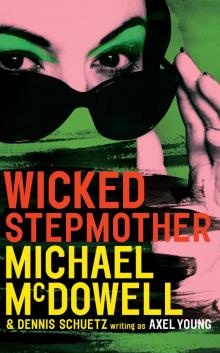 Wicked Stepmother
Wicked Stepmother Blackwater: The Complete Caskey Family Saga
Blackwater: The Complete Caskey Family Saga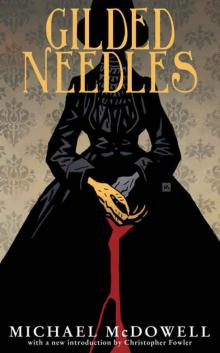 Gilded Needles (Valancourt 20th Century Classics)
Gilded Needles (Valancourt 20th Century Classics)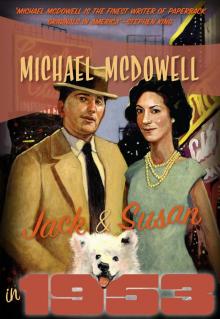 Jack and Susan in 1953
Jack and Susan in 1953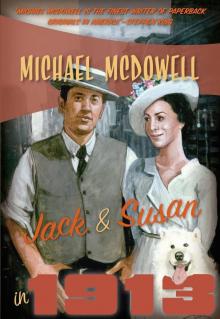 Jack and Susan in 1913
Jack and Susan in 1913 Rain
Rain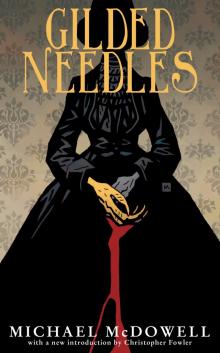 Gilded Needles
Gilded Needles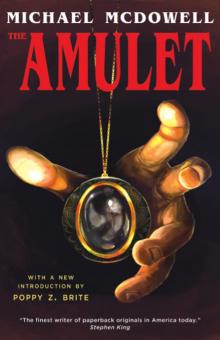 The Amulet
The Amulet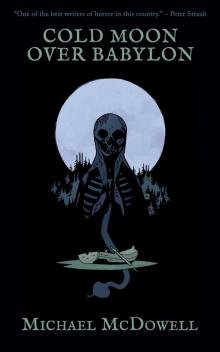 Cold moon over Babylon
Cold moon over Babylon The Elementals
The Elementals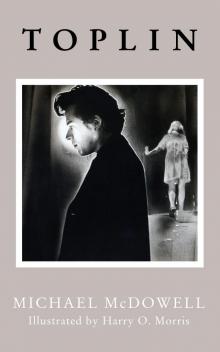 Toplin
Toplin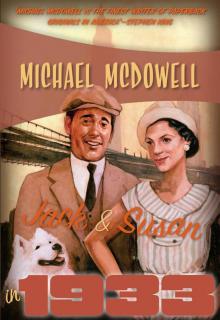 Jack and Susan in 1933
Jack and Susan in 1933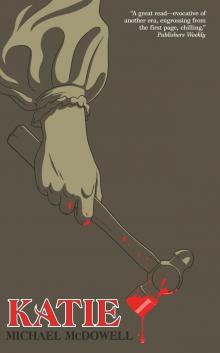 Katie
Katie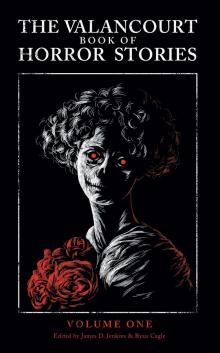 The Valancourt Book of Horror Stories
The Valancourt Book of Horror Stories